
Sir Alan Ayckbourn is a prolific British playwright and director. He has written and produced as of 2024, 90 full-length plays in Scarborough and London and was, between 1972 and 2009, the artistic director of the Stephen Joseph Theatre in Scarborough, where all but four of his plays have received their first performance. More than 40 have subsequently been produced in the West End, at the Royal National Theatre or by the Royal Shakespeare Company since his first hit Relatively Speaking opened at the Duke of York's Theatre in 1967.
Broadway Bound is a semi-autobiographical play by Neil Simon. It is the last chapter in his Eugene trilogy, following Brighton Beach Memoirs and Biloxi Blues.
Annalee Jefferies is an American stage actress.
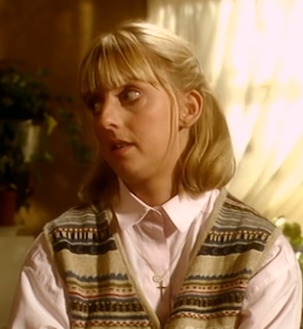
Emma Gwynedd Mary Chambers was an English actress who performed in television, film, and the theatre. She played Alice Tinker in the BBC comedy The Vicar of Dibley and Honey Thacker in the film Notting Hill (1999).
Lesley Sharp is an English stage, film, and television actress whose roles on British television include Clocking Off (2000–2001), Bob & Rose (2001) and Afterlife (2005–2006). She was nominated for the BAFTA Award for Best Actress in a Supporting Role for the 1997 film The Full Monty. Her other film appearances include Rita, Sue and Bob Too (1986), Naked (1993), Priest (1994), From Hell (2001), and Vera Drake (2004). Between 2011 and 2016, she starred as DC Janet Scott in the ITV drama Scott & Bailey.

Woman in Mind (December Bee) is the 32nd play by English playwright Alan Ayckbourn. It was premiered at the Stephen Joseph Theatre In The Round, Scarborough, in 1985. Despite pedestrian reviews by many critics, strong audience reaction resulted in a transfer to London's West End. The play received its London opening at the Vaudeville Theatre in 1986 where it received predominantly excellent reviews.

Sophie Lara Winkleman, styled as Lady Frederick Windsor, is an English actress. She is married to Lord Frederick Windsor, the second cousin of King Charles III and son of Prince Michael of Kent.
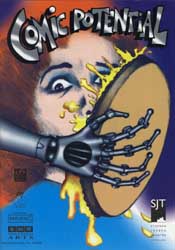
Comic Potential by Alan Ayckbourn is a romantic sci-fi comedy play. It is set in a TV studio in the foreseeable future, when low-cost androids have largely replaced actors.

House and Garden are a diptych of plays written by the English playwright Alan Ayckbourn, first performed in 1999. They are designed to be staged simultaneously, with the same cast in adjacent auditoria, and were published together as House & Garden. House takes place in the drawing room, and Garden in the grounds, of a large country house. Each play is self-contained, and they may be attended in either order. As is typical of his work, Ayckbourn portrays the mostly bittersweet relationships between more or less unhappy, upper-middle-class people. The title is a tongue-in-cheek reference to the magazine House & Garden, in which country houses and gardens are often portrayed as idyllic, peaceful places.
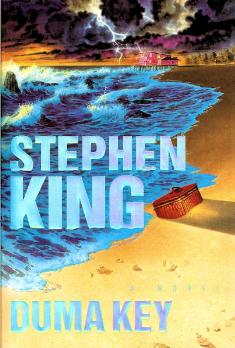
Duma Key is a novel by American writer Stephen King published on January 22, 2008, by Scribner. The book reached No. 1 on the New York Times Best Seller list. It is King's first novel to be set in Florida, as well as the first to be set in Minnesota. The dust jacket features holographic lettering.
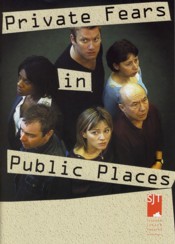
Private Fears in Public Places is a 2004 play by British playwright Alan Ayckbourn. The bleakest play written by Ayckbourn for many years, it intimately follows a few days in the lives of six characters, in four tightly-interwoven stories through 54 scenes.

Auriol Smith is an English actress and theatre director. She was a founder member and associate director of the Orange Tree Theatre in Richmond, London. She co-founded the theatre in 1971 with her husband Sam Walters, who became the United Kingdom's longest-serving artistic director. Walters and Smith stepped down from their posts at the Orange Tree Theatre in June 2014.
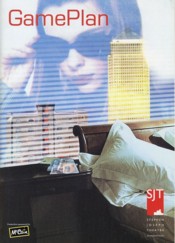
GamePlan is a 2001 play by British playwright Alan Ayckbourn, the first in a trilogy of plays called Damsels in Distress The darkest of the three plays, it is about a teenage girl who tries to support herself and her mother through prostitution.
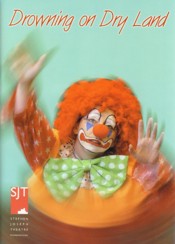
Drowning on Dry Land is a 2004 play by British playwright Alan Ayckbourn, his 66th to be produced. Exploring the culture of B-list celebrities, it is a comedy about the rise and fall of Charlie Conrad, a man apparently famous for being a failure.
Humble Boy is a 2001 English play by Charlotte Jones. The play was presented in association with Matthew Byam Shaw and Anna Mackmin, and was first performed on the Cottesloe stage of the Royal National Theatre on 9 August 2001.

If I Were You is a 2006 play by British playwright Alan Ayckbourn. It is about an unhappy married couple who are given the chance to understand each other by discovering, quite literally, what they would do "if I were you," in the same manner as the novel Turnabout by Thorne Smith.

Sugar Daddies is a 2003 play by British playwright Alan Ayckbourn. It is about a student who forms a friendship with a rich man over three times her age, who has a sinister past, and maybe a sinister present too.

Haunting Julia is a 1994 play by British playwright Alan Ayckbourn. It is about Julia Lukin, a nineteen-year-old brilliant musician who committed suicide twelve years earlier, who haunts the three men closest to her, through both the supernatural and in their memories. In 2008, it was presented as the first play of Things That Go Bump.

My Wonderful Day is a 2009 play by Alan Ayckbourn. It is about a nine-year-old girl, Winnie, who has an essay to write about her day, and records the shenanigans of grown-ups around her.
















